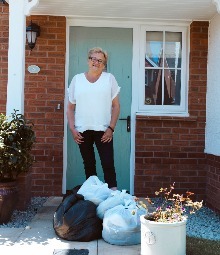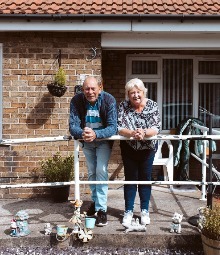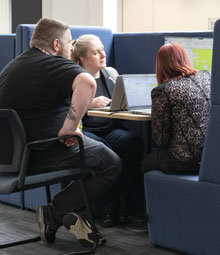Beware of switching – the advice is to do nothing
Energy prices are currently very high. Many people are looking to find a cheaper deal, however, it’s likely your supplier’s standard default tariff rate, set at the energy price cap by regulator Ofgem that will be the cheapest rate available.
This means the average household in England, Wales and Scotland will pay no more than £1,277 a year (£1,309 if you’re on a prepayment tariff) on your gas and electricity provider’s default (also called standard variable) tariff.
You could pay more or less than this if your energy use is greater or lower.
The price rise has been caused by an increase in wholesale gas prices (the amount that energy firms pay), which have seen a steep rise since October 2021. Gas prices have hit a record high as the world emerges from lockdown as well as other economic factors having an impact. This means that changes in wholesale prices are passed on to households through rising energy bills.
The advice by energy saving experts is to do nothing but try and reduce your energy consumption.
Here are some handy tips on how you can save energy:
| Changes to make | Potential annual savings |
| Swap a bath a week for a shower | £7 |
| Reduce dishwasher usage | £10 |
| Turn off the lights when not needed | £14 |
| Use 30 degree setting on the washing machine | £20 |
| Only boil enough water in the kettle | £22 |
| Reduce drafts around door and windows | £30 |
| Don’t leave electronics on standby – switch them off | £40 |
| Avoid the tumble dryer | £40 |
| Reduce heating by 1 degree | £55 |
Hints and tips to reduce the energy you use
It may be hard to find cheaper tariffs now, but you can still save on your energy bills by reducing your energy consumption. Follow our tips and advice for straightforward ways to save energy, lower your bills and reduce your carbon footprint.
We’re all responsible for the energy we use in our homes. Look at our quick tips and see how you could save up to £283 a year* on your bills.
For more information go here.
You can save more by reviewing how you use your heating system. There are different types of heating controls, so for specific advice, contact ForHousing and we can send you a user guide. If it’s easier for you, these can often be found online by searching for the manufacturer’s name.
*Details from the Energy Saving Trust
- Use your heating controls, such as thermostats and timers, to heat your home without wasting energy.
- Make sure you keep your living room (or the room you use most) warm during the day while you’re at home at 21°C (70°F) and heat your bedroom to 18°C (64°F) before you go to bed.
- Don’t forget if you don’t need it, turn your heating off when you go to bed.
- If you can reduce these temperatures by an average of 1oC you could save £55 a year.
- If there are rooms you don’t use, like a spare bedroom, turn off the radiators in them and close the doors.
As with your room thermostat, you should set the radiator thermostatic radiator valves (TRV) in each room at a low level, then gradually turn them up until the room’s left at a comfortable temperature. Turning a TRV to a higher setting will not make the room heat up any faster – that depends on the boiler size and setting, and the radiator size. All it will do is keep heating the room until it’s at the temperature designated by the TRV.
Don’t forget to draw your curtains when its dark and tuck them behind radiators to minimise heat loss. And don’t forget if you are away from your home turn the thermostat off.
Could you save by switching to a water meter?
A water meter means you only pay for the water you use and you might make significant savings.
The majority of households who switch to a water meter make a saving on their water bills. The good news is that you have up to 24 months to try the meter before you decide if you wish to go back to rateable value bills if you’re not making a saving.
United Utilities also offer a lowest bill guarantee during your two-year trial period. This means that during this time they will compare your water meter charges against what you would have paid on your old rateable value bills and charge you the lower amount. Then, after the two-year trial you can switch back to your rateable value bills if you haven’t made a saving. So you’ve really got nothing to lose when you apply for a water meter. For more information contact United Utilities – 0345 672 299.
Energy help and support for low income and vulnerable households
Warm Home Discount Scheme – You could get £140 off your electricity bill . The money is not paid to you – it’s a one-off discount on your electricity bill, between October and March.
You may be able to get the discount on your gas bill instead if your supplier provides you with both gas and electricity. Contact your supplier to find out.
Suppliers are not taking any more applications for the 2021/22 scheme at present. The Government is currently reviewing the 2022/23 scheme, with schemes likely to open during September 2022.
Watch this space for more information.
Winter Fuel Payment – If you were born on or before 26 September 1955 you could get between £100 and £300 to help you pay your heating bills. This is known as a ‘Winter Fuel Payment’.
You usually do not need to claim Winter Fuel Payment – you’ll get it automatically if you’re eligible.
If you have not got a Winter Fuel Payment before, you only need to claim if any of the following apply:
- You do not get benefits or a State Pension
- You only get Housing Benefit, Council Tax Reduction, Child Benefit or Universal Credit
- You get benefits or a State Pension but live in Switzerland or an EEA country
- If you have got a Winter Fuel Payment before, you only need to claim if since your last payment you have either:
- Deferred your State Pension
- Moved to Switzerland or an EEA country
Go to the following Government site for more information Winter Fuel Payment or call 0800 731 0160.
Cold Weather Payment – You’ll get a payment if the average temperature in your area is recorded as, or forecast to be, zero degrees celsius or below over 7 consecutive days. You’ll get £25 for each 7 day period of very cold weather between 1 November and 31 March.
Receiving the Cold Weather Payment also depends on certain criteria – e if you are in recipe of Pension Credits, Income Support JSA or Universal Credit. For full details of eligibility go to the Gov site – Cold Weather Payment.
If you do not receive your Cold Weather Payment, Tell the Pension Service or Jobcentre Plus if you think you should’ve received a Cold Weather Payment but you have not.
If you’re getting Universal Credit, sign in to your account and add a note to your journal.
If you do not have an online account, ring the Universal Credit helpline instead. The phone number is on letters about your Universal Credit claim.















